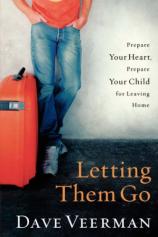Letting Them Go: Prepare Your Heart, Prepare Your Child for Leaving Home
Review
Letting Them Go: Prepare Your Heart, Prepare Your Child for Leaving Home
With our youngest off to college last September and our oldest newly graduated and living at home looking for a job, it was with great anticipation that I picked up LETTING THEM GO by prolific author Dave Veerman (more than 40 books!). Despite a few flaws, I was not disappointed. This is a solid book, full of practical information for parents trying to strike a difficult balance between loving their "child" and segueing into the adult child/parent relationship. It's most applicable and helpful to Christian parents who have college-bound high school students.
Veerman's book utilizes plenty of pull-quotes from other parents and writers, boxed text, and chapter introduction graphics, evincing his expertise as co-founder of The Livingstone Corporation (which does book development and packaging). The resulting short bursts of copy will appeal to parents who want help and good information but don't particularly like to engage with long sections of text.
One of the best sections of the book deals with "experimentation" with varieties of Christian worship. Kids who grew up with formal worship may start attending a charismatic church, for example. Or, teens raised in a nondenominational contemporary worship-style church may find comfort in the liturgy at a mainline church.
"Often, however, these young people are simply trying to find their own worship style, where they fit and feel connected to God," writes Veerman. "It's part of the process of personalizing faith, making it their own." He also wisely cautions, "While home at break, students may express strong, negative opinions about their spiritual past and the home church… Try not to react emotionally to those charged statements. Consider these tensions as growing pains." As a Presbyterian who has one child joining the Russian Orthodox church and another considering Catholicism, I found his words to be both wise and timely.
And what about the kid who expresses doubt about any sort of faith at all? "…our son or daughter is growing up and is honest," writes Veerman, and goes on to help parents with ideas for coping, including reminding them to "rely on God and encourage your student to be an honest seeker in his or her search for the truth." Excellent advice.
I found a couple of "wish I'd done this" sections, especially one on preparing siblings for adjustment when they return home for the first time. Good stuff, and I wish I would have prepared my kids better for this life transition. "Making New Assignments" talks about the importance of reassigning chores and the best way to handle the situation. I found this helpful, as kids tend to come back from college breaks and summers feeling as if they no longer have housework responsibilities. I plan to try a few of his ideas this summer.
My disappointments in the content were minor. Veerman takes pains to include non-college bound scenarios in his book, but the emphasis is definitely on parenting and letting go of a college-bound high school student. It would be nice to see some other scenarios more fully fleshed out, although he often gives a token aside to teens leaving for the military. I would have appreciated some ideas for "letting go" of college graduates who return home, then leave again (my situation and that of many other parents of my acquaintance). It would have also been helpful to have advice on teens who choose to live at home and go to junior college, or work a few years after high school. There's an allusion to this ("Some young adults continue to live at home or come back after they've been on their own for a while") but not much else.
I also thought a few of the boxed scripture sections felt like filler rather than having any direct application to parenting children leaving the nest ("Opportunities" or "Of Learning and Lessons" as two examples). Others, however, were very helpful (a section of scripture verses helping parents deal with fear and anxiety). Occasionally, I wish a topic was unpacked a bit more (in a section on "intervention," he mentions it is called for when a child exhibits "symptoms of neurosis or worse." I wondered --- What might this look like? How would a parent intervene?)
Despite these few quibbles, this is a solid book with reassuring advice. If you are a Christian mom or dad with a child leaving for college, you'll find this a helpful, encouraging read.
-
Reviewed by Cindy Crosby on November 13, 2011



